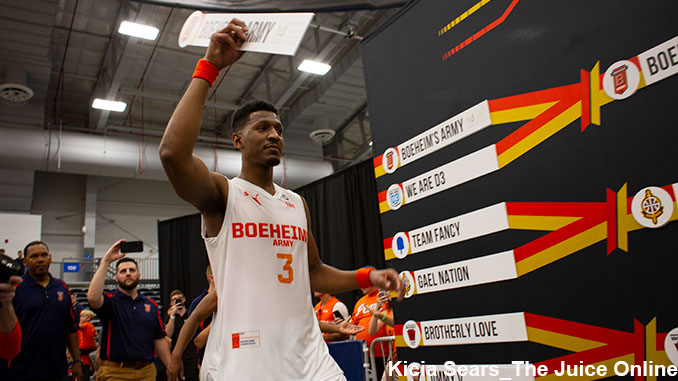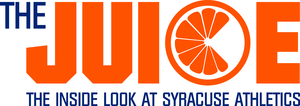
Boeheim’s Army returns to The Basketball Tournament with their opening game coming up Saturday. The Army looks to avenge their brief disappointing run from last summer, as the team got bounced in their second game, dropping a 65-48 contest to Sideline Cancer that included a 10-0 run during the Elam’s Ending phase to make the final score a little less embarrassing.
The offense’s struggles were a theme in the Army’s brief appearance last summer, as the team finished 22nd of 23 teams in points scored, field goal percentage, and three-point field goal percentage. In the loss to Sideline Cancer, Boeheim’s Army shot 30.3 percent overall and made just 4-of-27 (14.8 percent) shots from three. Their earlier win over Men of Mackey was not particularly better, as they mustered a 41.5 percent overall accuracy mark and made 19.0 percent from behind the arc.
That poor shooting is why this year’s assembled Army has a distinct non-Syracuse flavor to it. DeAndre Kane, D.J. Kennedy, Tyrese Rice, and Keifer Sykes were all imported to the squad to help on the offensive end of the floor.
Kane and Kennedy have already established their reputations in The Basketball Tournament as skilled offensive players on Overseas Elite, winning multiple championships (Kane three, Kennedy four) as major parts of that dynasty.
Kane averaged 8.8 points per game in 22 TBT games over four years, shooting over 57 percent from the floor and 40.5 percent from three-point range. In each of his four TBT appearances, Kane made over half his shots from the field and connected on over 40 percent from deep in his last three tourneys.
Kennedy has already played in 27 games over five appearances in The Basketball Tournament, rolling up 436 points (16.1 per game) in that time. A consistent, efficient offensive player, Kennedy averaged at least 14.3 points and shot at least 45.6 percent from the field in each tourney. After averaging 18.0 and 19.3 points in his first two tourneys, Kennedy settled in between 14.3 and 15.0 in his last three. It also does not hurt that Kennedy has averaged 8.6 rebounds and 2.9 assists per game in TBT play with the boards sliding in recent efforts but the dimes picking up to offset his sliding scoring.
Rice has been an effective point guard going back to his collegiate career at Boston College over a decade ago. After averaging over 17 points and five assists per game in each of his last three seasons for the Eagles, Rice has been piling up double digits in points and at least four assists per game in leagues around the world as long as he has gotten a mere 18 minutes per game.
Sykes averaged 16.5 points and 4.1 assists per contest while shooting 45.4 percent from the field at Wisconsin-Green Bay. Like Rice, Sykes has continued to play effectively around the world, regardless of stop, and should combine with Rice to provide the Army with punch from point guard spot.
This quartet will join the most consistent scorer in Boeheim’s Army history, the seemingly ageless Eric Devendorf. In TBT play, Devendorf has been almost automatic, leading the Army in scoring in each of the last five tournaments with averages ranging from 15.0 to 21.1 points per game. The veteran two-guard has made exactly half of his shots for Boeheim’s Army, shooting between 46.7 and 54.8 percent in each tournament, and holds a 17.1 career points per game average in The Basketball Tournament.
If reading that was too strenuous, here’s the shorthand: Boeheim’s Army will be loaded in the backcourt and on the wings before you get to the rostered Syracuse players of recent vintage – C.J. Fair, Malachi Richardson, and Andrew White III.
And why is that offensive improvement necessary?
To get the offense to be as good as the 2-3 zone.
Yep, that’s right. Even though they are not coached by their namesake, Boeheim’s Army should stick with the zone. In the six tournaments in which Boeheim’s Army has participated, here is the average shooting line for any team in any game in TBT play, including Boeheim’s Army:
45.2% overall field goals, 35.8% three-point field goals, 52.1% two-point field goals
Here in what Boeheim’s Army gives up playing the 2-3 zone:
40.8% overall field goals, 32.3% three-point field goals, 48.7% two-point field goals
That’s right, while all the Syracuse guys on Boeheim’s Army have played it for at least one season, most have not played it in quite some time and often do not have that much familiarity with the guys with whom they are playing. And the non-Orange players have never played it before. Between Willie Deane, Olu Famutimi, Jordan Crawford, and Will Rayman, the Army has more often than not had at least one non-SU player on the team. And there is not a whole lot of practice time running up to the tournament.
And the 2-3 zone is still significantly better than the average TBT defensive unit.
» Related: GM Belbey says Syracuse alumni team Boeheim’s Army has ‘best roster’ in TBT history
In fact, in their 21 games in TBT play, the Army has held an opponent to under 40 percent field goal shooting ten times and under 30 percent shooting from three-point range on nine occasions. Considering that their opponents have launched 48.1 percent of their field goal attempts from beyond the arc, that stingy three-point defense has been a key for Boeheim’s Army.
In fact, last summer’s aforementioned offensive flop was the only time the Army has lost while allowing under 30 percent from long range. Sideline Cancer actually logged the weakest three-point attack that Boeheim’s Army’s 2-3 zone has ever given up, making just 6-of-34 triple tries (17.6 percent).
The zone defense is where the players on Boeheim’s Army who have not been mentioned come in. Specifically, they come in very close proximity to the basket.
Tyler Lydon and Chris McCullough are the big men on the roster who will play a major role without necessarily contributing greatly on offense, even though they are both more than capable.
Lydon has plenty of experience in anchoring the 2-3 zone, as evidenced by his school record for most blocked shots in an NCAA Tournament, and McCullough has the size to do it, as well, as he blocked over two shots per game in his brief time at Syracuse. Both add the capability of perimeter shooting so that one could play forward next to the other while simultaneously creating spacing with their shooting abilities.
If that big man tandem can help deter opponents on the inside, the other defenders on the court will be able to play aggressively and force turnovers that they can convert into quick points.
And that, of course, will help keep Boeheim’s Army marching along.
For more Syracuse coverage, Like our Facebook page, follow us @TheJuiceOnline and listen to our podcast.

